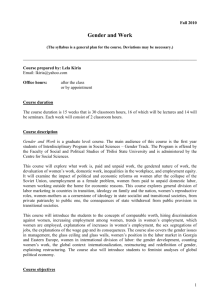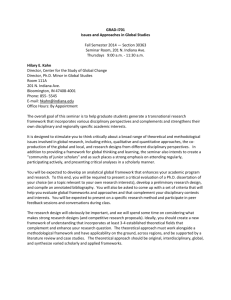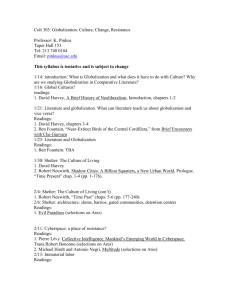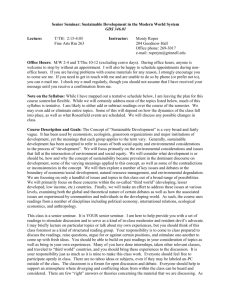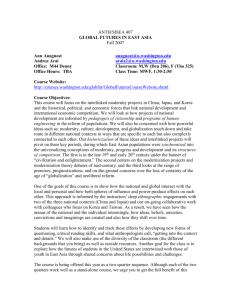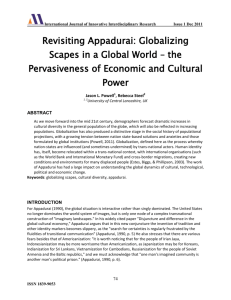I701 Multidisciplinary Seminar on Issues and Approaches in Global
advertisement
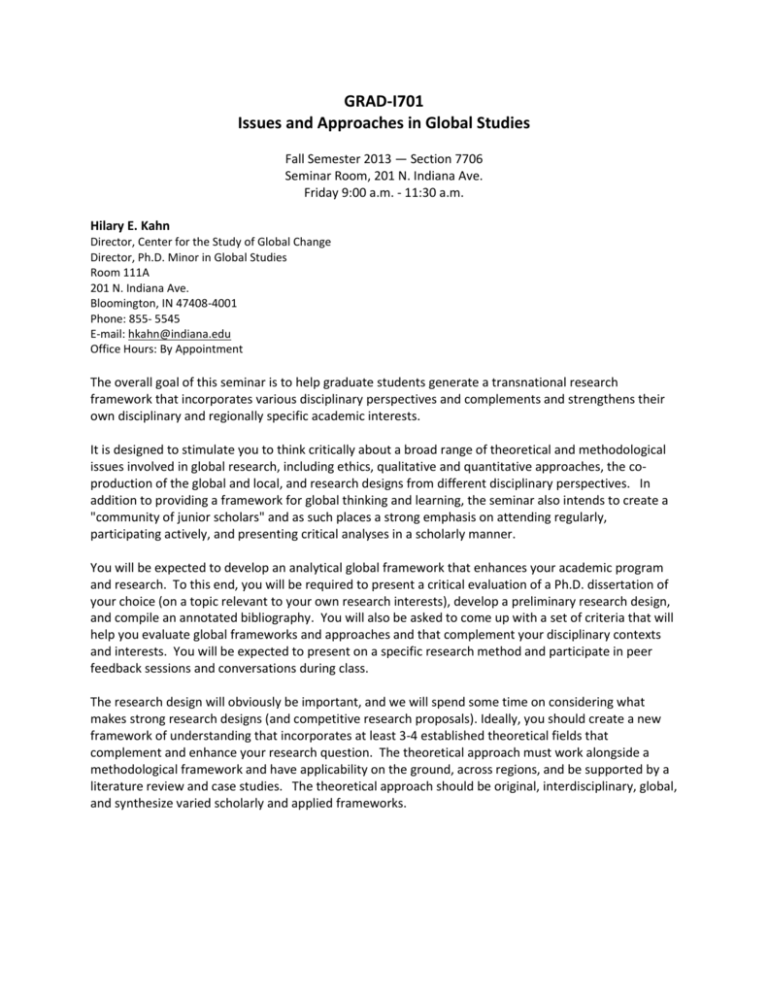
GRAD-I701 Issues and Approaches in Global Studies Fall Semester 2013 — Section 7706 Seminar Room, 201 N. Indiana Ave. Friday 9:00 a.m. - 11:30 a.m. Hilary E. Kahn Director, Center for the Study of Global Change Director, Ph.D. Minor in Global Studies Room 111A 201 N. Indiana Ave. Bloomington, IN 47408-4001 Phone: 855- 5545 E-mail: hkahn@indiana.edu Office Hours: By Appointment The overall goal of this seminar is to help graduate students generate a transnational research framework that incorporates various disciplinary perspectives and complements and strengthens their own disciplinary and regionally specific academic interests. It is designed to stimulate you to think critically about a broad range of theoretical and methodological issues involved in global research, including ethics, qualitative and quantitative approaches, the coproduction of the global and local, and research designs from different disciplinary perspectives. In addition to providing a framework for global thinking and learning, the seminar also intends to create a "community of junior scholars" and as such places a strong emphasis on attending regularly, participating actively, and presenting critical analyses in a scholarly manner. You will be expected to develop an analytical global framework that enhances your academic program and research. To this end, you will be required to present a critical evaluation of a Ph.D. dissertation of your choice (on a topic relevant to your own research interests), develop a preliminary research design, and compile an annotated bibliography. You will also be asked to come up with a set of criteria that will help you evaluate global frameworks and approaches and that complement your disciplinary contexts and interests. You will be expected to present on a specific research method and participate in peer feedback sessions and conversations during class. The research design will obviously be important, and we will spend some time on considering what makes strong research designs (and competitive research proposals). Ideally, you should create a new framework of understanding that incorporates at least 3-4 established theoretical fields that complement and enhance your research question. The theoretical approach must work alongside a methodological framework and have applicability on the ground, across regions, and be supported by a literature review and case studies. The theoretical approach should be original, interdisciplinary, global, and synthesize varied scholarly and applied frameworks. Final Grade will be calculated from the following required assignments: Annotated Bibliography 20% Topic in 10 words or less and description of entry point 5% Criteria for Assessing Global Frameworks 10% Presentation and Written Summary on Research Methods 10% Dissertation Critique (presentation and 2-3 page written summary) 20% Research Design (presentation and written document) 30% Peer Reviewing, General Participation 5% Course Goals To re-define and expand areas of research to an interdisciplinary and transnational sphere To incorporate established “global” theories and methods in students’ own approaches To integrate some of the core concepts involved in scholarly considerations of globalization To be able to generate new analytical framework of understanding To articulate the significance of this framework in disciplinary contexts To put this framework into action and/or application To evaluate and analyze global research and recognize its usefulness in research writ large The Schedule Aug 30 Introductions What exactly is global studies? Starting with a bit of context Sept 6 Defining key concepts and reviewing frameworks for thinking globally Sept 13 READINGS: 1) Emirbrayer 2) Rockefeller (Flow) 3) Jennings 4) Shaw DUE: Name and description of dissertation (to be critiqued) Connections: society, culture, politics, networks, and systems READING: 1) Meyer 2) Buhari Gulmez 3) Appadurai The Role of library research in the 21st Century GLOBAL STUDIES LIBRARIAN: MARIAN FRANK-WILSON GLOBAL RESEARCH WITHIN AND BEYOND THE DISCIPLINES Sept 20 Connections continued: spaces and places Sept 26 Sept 27 READINGS: 1) Massey 2) Lefebvre 3) Bebbington 4) Gershon DUE: Description of subject in 10 words or less and entry point FRAMING THE GLOBAL CONFERENCE: (must register at http://framing.indiana.edu/conference/) 2:30-4:30pm Opening Session about global approaches (Oak Room, IMU) 5:00pm Arjun Appadurai Keynote and Reception (Frangipani Room, IMU) 9:00 am FRAMING THE GLOBAL CONFERENCE (Oak and Walnut Room) Coffee, tea, and pastries available at 8am Conference continues through September 28 Oct 4 Global Media and Communication Oct 11 READINGS: 1) Miller 2) Straubhaar 3) Cottle WORK IN PROCESS: Annotated Bibliography (due on October 25) Histories, Oceans, and Literature: Musing about time and space READINGS: 1) Crichlow, Metzgar, and Northover 2) Grew 3) Ho 4) Dimock Introduction and Chapter Two 5) Arif Dirlik Oct 18 FALL BREAK Oct 25 Supply Chains, Neoliberalisms, and Imagining Development READINGS: 1) Tsing, 2) Ziegler 3) Ong 4) Donnelly and Smith DUE: Annotated Bibliography Nov 1 Relativism, Universalism, and Essentialism across disciplines and regions READINGS: 1) Appiah 2) Nussbaum 3) Mohanty Sovereignty: Global Governance, Civil Society, and the State Nov 8 1) Waters 2) Kaldor 3) Hardt and Negri 4) Sassen Dissertation Critiques PRESENTATIONS AND PEER REVIEW FEEDBACK DUE: Dissertation Critique: written summary Nov 15 Educating in a Global Context READING: 1) Wildavsky 2) Spivak Writing Competitive Research Proposals Visit from Paul Fogelman Nov 22 Methods for Global Research: Mini Presentations READINGS: 1) Beyond Methodological Nationalism DUE: Method Statements Nov 29 THANKSGIVING Dec 6 Global Ethnography and Post-colonial identities READINGS: 1) Hart 2) Tsing 3) Nordstrom 4) Kahn 5) Comaroff DUE: Criteria for Global Frameworks Dec 13 Presentations Dec 16 DUE: Final Research Designs LIST OF READINGS/SOURCES OF READINGS Amelina, Anna, Nergiz, Devrimsel D., Faist, Thomas, and Nina Glick Schiller, eds. (2012) Beyond Methodological Nationalism: Research Methodologies for Cross-Border Studies. Routledge. Appadurai, Arjun (2005) Modernity at Large: Cultural Dimensions of Globalization. University of Minnesota Press. Appiah, Kwame Anthony (2006) Cosmopolitanism: Ethics in a World of Strangers. W.W. Norton and Co. Bebbington, Anthomy (2003) Global Networks and Local Developments: Agenda for Development Geography. Tijdschrift voor Economische en Sociale geografie, 94(3)297-309. Buhari Gulmez, Didem (2009) A Selective Survey of Globalization Studies: The Cultural Deficit.. New Global Studies 3(2), 1-13. Crichlow, Michaeline, Metzger, Sean, and Patricia Northover (2009) Race, Space, Place: The Making and Unmaking of Freedoms in the Atlantic World and Beyond. Cultural Dynamics: Insurgent Scholarship on Culture, Politics and Power, 21(3)215-222. Comaroff, Jean and John Comaroff (2009) Ethnicity Inc. University of Chicago Press. Cottle, Simon (2011) Taking global crises in the news seriously: Notes from the dark side of globalization. Global Media and Communication, 7(2):77-95. Curtin, Michael (2011) Global Media Capital and Local Media Policy. In the Handbook of Political Economy of Communication. Janet Wasko, Gragham Murdocky, and Helena Sousa, eds. Blackwell Publishing. Dimock, Wai Chee (2006 ) Through Other Continents: American Literature Across Deep Time. Princeton University Press. Dirlik, Arif (2005) Asia Pacific Studies in the age of Global Modernity. Inter-Asia Cultural Studies, 6(2):158-170. Emirbayer, Mustafa (1997) Manifesto for a relational sociology. The American Journal of Sociology, 103( 2): 281317. Gershon, Ilana (2010) Bruno Latour. Available on academia.edu Grew, Raymond (2006) Expanding Worlds of World History. The Journal of Modern History, 87(4)878-898. Hardt, Michael and Anthony Negri (2001) Empire. Harvard University Press. Hart, Gillian (2002) Disabling Globalization: Places of Power in Post-Apartheid South Africa. University of California Press. Ho, Enseng (2004) Empire through Diasporic Eyes: A View from the Other Boat. Society for Comparative Study of Society and History, 4(210-246), Jennings, Justin (2010) Globalizations and the Ancient World. Cambridge University Press. Kahn, Hilary (2003) Traversing the Q’eqchi’ Imaginary: The Conjecture of Crime in Livingston, Guatemala, in Crime’s Power: Anthropologists and the Ethnography of Crime, S. Kane and P. Parnell, eds., Palgrave Macmillan. pp 33-54. Kaldor, Mary (2003) The idea of a global civil society. International Affairs,79(3): 583-593. Available online http://onlinelibrary.wiley.com/doi/10.1111/1468-2346.00324/pdf LeFebvre, Henri (1991) The Production of Space. D. Nicholson-Smith, translator. Malden, MA: Blackwell Publishing. Massey, Doreen (2004). Geographies of responsibility. Geografiska Annaler: Series B, Human Geography, 86(1), pp. 5–18. Meyer, John W, John Boli, George Thomas, and Francisco Ramirez (1997) World Society and the Nation-State. AJS, 103(1):144-81. Miller, Daniel (2011) Tales from Facebook. Polity. Mohanty, Satya (1995) Epilogue. Colonial Legacies, Multicultural Futures: Relativism, Objectivity, and the Challenge of Otherness. PMLA: 110(1): 108-118 Nordstrom, Carolyn (2007) Global Outlaws: Crime, Money, and Power in the Contemporary World. University of California Press. Nussbaum, Martha (1993) Social Justice and Universalism: In Defense of an Aristotelian Account of Human Functioning. Modern Philology, 46-73. Ong, Aihwa (2006) Neoliberalism as a mobile technology. Transactions, 32:3-8. Princen, Thomas (1997) The Shading and Distancing of Commerce. When internationalization is not enough. Ecological Economics, 20;235-253. Rockefeller, Stuart Alexander (2011) Flow. Current Anthropology, 52(4)557-578. Sassen, Saskia (2006) Territory, Authority, Rights: From Medieval to Global Assemblages. Princeton University Press. Shaw, Martin (2003) The Global Transformation of the Social Sciences, in The Global Civil Society Yearbook. M. Kaldor et al., eds. London Sage. Smith, Matt and John Donnelly (2004) Power, Inequality, Change and Uncertainty: Viewing The World Through the Development Prism. Studies in Qualitative Methodology. 123-145. Spivak, Gayatri (2012) An Aesthetic Education in the Era of Globalization. Harvard University Press. Straubhaar, Joseph D. Global, Hybrid or Multiple? Cultural Identities in the Age of Satellite TV and the Internet. Available on academia.edu. Tsing, Anna Lowenhaupt (2005) Friction: An Ethnography of Global Connections. Princeton University Press. Waters, Tim (2009) The Momentous Gravity of the State of Things Now Obtaining': Annoying Westphalian Objections to the Idea of Global Governance. Indiana Journal of Global Legal Studies. 16(1): 25-58. Wildavsky, Ben (2010) The Great Brain Race: How Global Universities are Reshaping the World. Princeton University Press. Ziegler, Catherine (2010) Fair Flowers: Environmental and Social Labeling in the Global Cut Flower Trade. In Fair Trade and Social Justice: Global Ethnographies., Sarah Lyon and Mark Moberg, eds. New York University Press.


